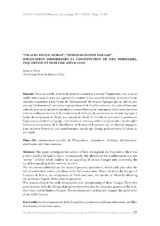"Palacio donde morar". "Heredad donde holgar". Spéculation immobilière et constitution de fief nobiliaire. Inquisition et noblesse andalouse
Autor
Perez, Béatrice
Editor
Universidad de Córdoba, UcoPressFecha
2015Materia
Conséquences sociales de l’InquisitionPromotion
Noblesse
Déclassement
Distribution des biens conversos
Social consequences of the Inquisition
Fiefdom
Downward mobility
Distribution of converso assets
METS:
Mostrar el registro METSPREMIS:
Mostrar el registro PREMISMetadatos
Mostrar el registro completo del ítemResumen
Dans cet article, je tente de montrer comment, à travers l’Inquisition, s’est joué un conflit sourd pour la terre qui a permis la création d’une nouvelle noblesse de service. Cette création s’apparente à une forme de surclassement" de certains lignages, qui est allé de pair avec un "déclassement" inversement proportionnel de familles conversas. Les deux thèmes que j’aborde sont les enjeux de la spéculation immobilière qui se joue autour de la vente des biens urbains confisqués et ceux de la constitution de fiefs dans la promotion de certains lignages, en particulier de celui des Enríquez de Ribera, à la tête du marquesado de Tarifa, puis ducado de Alcalá. Le but fut de permettre la promotion fulgurante et solide d’un lignage, c’est l’évidence, mais par-delà le cas particulier, l’arrière-plan foncier et économique de la distribution de la terre et le pouvoir qui en découle engagent, à un moment déterminé, une transformation sociale qui change profondément la donne au XVIe siècle. This paper investigates the subject of how, throughout the Inquisition, there was a silent conflict for land in Spain. Consequently, this allowed for the establishment of a new “service” nobility which resulted in an upgrading of certain lineages and, conversely, the social downgrading of the converso families. The two themes addressed are the issues of property speculation, which took place after the sale of confiscated estates, and those of the fief constitution. These enhanced the lineages of Enríquez de Ribera, the marquesado de Tarifa and, later, the ducado de Alcalá by affording the purchases of parts of the converso property. This process allowed the swift advancement and strengthening of these lineages. From this point in time, with the change of property ownership and the economic pattern of the land, there was a redistribution of power. This transformation profoundly changed the social order of the 16th Century.

